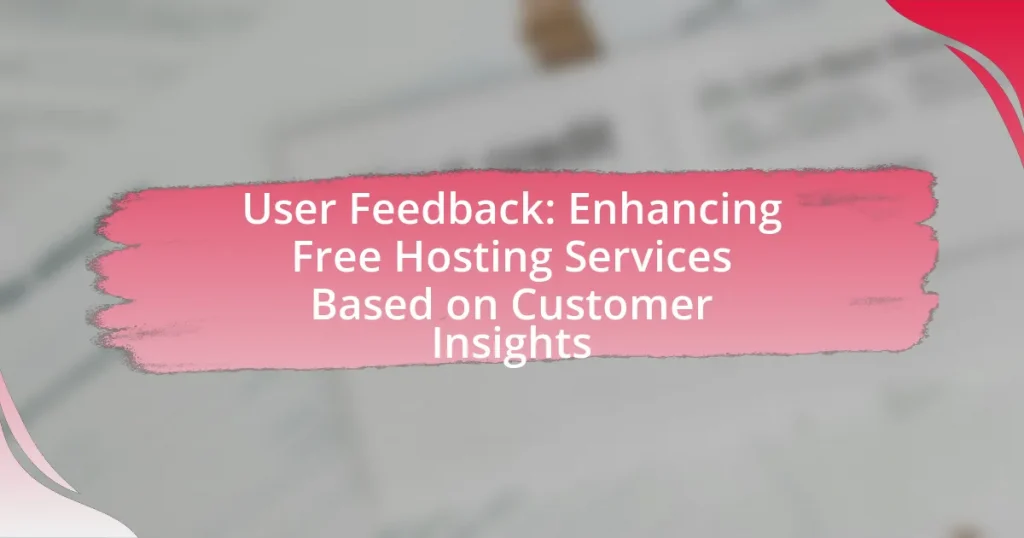The article focuses on the essential features to consider when selecting free hosting services, emphasizing reliability, storage capacity, bandwidth, customer support, and security measures. It highlights the differences between free and paid hosting options, detailing common limitations such as restricted resources and inadequate support. Performance metrics are compared, showcasing the advantages of paid services in terms of speed and uptime. Additionally, the article discusses the importance of uptime reliability, security features, and the implications of hidden fees and data ownership policies. Practical tips for choosing the right free hosting service are also provided, ensuring users make informed decisions.

What are the Essential Features to Look for in Free Hosting Services?
Essential features to look for in free hosting services include reliability, storage capacity, bandwidth, customer support, and security measures. Reliability ensures that the service has minimal downtime, which is crucial for maintaining website accessibility. Storage capacity should be sufficient to accommodate website files, while bandwidth affects the amount of data transferred, impacting site performance. Customer support is vital for resolving issues quickly, and security measures protect against data breaches and cyber threats. According to a 2021 survey by HostingAdvice, 70% of users prioritize uptime and support when selecting a hosting service, highlighting the importance of these features.
How do free hosting services differ from paid options?
Free hosting services differ from paid options primarily in terms of features, performance, and support. Free hosting typically offers limited storage, bandwidth, and functionality, often including advertisements on user sites, while paid hosting provides more resources, enhanced performance, and additional features such as custom domain names and better security. For instance, a study by HostingAdvice in 2021 indicated that paid hosting services generally deliver faster loading times and higher uptime percentages compared to free services, which can lead to a better user experience and improved SEO rankings.
What limitations are commonly found in free hosting services?
Free hosting services commonly have limitations such as restricted storage space, bandwidth caps, and lack of customer support. These constraints can hinder website performance and user experience. For instance, many free hosting providers offer only a few hundred megabytes of storage, which is insufficient for larger websites. Additionally, bandwidth limitations can lead to slow loading times or downtime during high traffic periods. Furthermore, the absence of reliable customer support can leave users without assistance when issues arise, making it difficult to resolve technical problems.
How do performance metrics compare between free and paid hosting?
Performance metrics indicate that paid hosting generally offers superior speed, uptime, and customer support compared to free hosting. For instance, paid hosting services often guarantee 99.9% uptime, while free hosting may experience frequent downtimes, averaging around 80% uptime. Additionally, paid hosting typically provides faster loading times, often under 2 seconds, whereas free hosting can exceed 5 seconds due to resource limitations. Furthermore, paid hosting usually includes enhanced security features and better scalability options, which are often lacking in free hosting services. These differences are supported by various industry studies that highlight the performance disparities between the two types of hosting.
What key features should you prioritize in free hosting services?
When selecting free hosting services, prioritize features such as storage capacity, bandwidth, uptime reliability, and customer support. Storage capacity is crucial as it determines how much data you can host; many free services offer limited space, typically ranging from 500 MB to 2 GB. Bandwidth affects how much traffic your site can handle; free hosting often comes with restrictions, usually between 1 GB to 10 GB per month. Uptime reliability is essential for ensuring your website is accessible; reputable free hosting services aim for at least 99.9% uptime. Lastly, customer support is vital, as responsive assistance can help resolve issues quickly; however, many free services offer limited support options, often relying on community forums.
Why is uptime reliability important for free hosting services?
Uptime reliability is crucial for free hosting services because it directly impacts user experience and website accessibility. High uptime ensures that websites remain available to visitors, which is essential for maintaining traffic and engagement. For instance, a service with 99.9% uptime translates to only about 8.76 hours of downtime annually, while a service with 90% uptime could experience over 36.5 days of downtime in the same period. This significant difference illustrates how uptime reliability affects a website’s performance and credibility. Therefore, free hosting services must prioritize uptime reliability to foster trust and retain users.
What storage and bandwidth limits should you expect?
Free hosting services typically offer limited storage and bandwidth, often ranging from 1 GB to 10 GB of storage and bandwidth caps between 5 GB to 100 GB per month. These limits are set to manage server resources and ensure fair usage among users. For instance, many free hosting providers impose these restrictions to encourage users to upgrade to paid plans, which offer more generous limits, such as unlimited storage and bandwidth.
How does customer support vary in free hosting services?
Customer support in free hosting services typically varies significantly in terms of availability, responsiveness, and quality. Many free hosting providers offer limited or no direct customer support, relying instead on community forums or self-help resources, which can lead to slower resolution times for issues. For instance, a study by HostingAdvice found that 70% of free hosting services do not provide 24/7 support, while only 30% offer email or chat options, often with long response times. This lack of robust support can hinder users, especially those who are less experienced, from effectively managing their websites.
What security features are essential in free hosting services?
Essential security features in free hosting services include SSL certificates, regular backups, malware scanning, and DDoS protection. SSL certificates encrypt data transmitted between users and the server, ensuring secure connections. Regular backups protect against data loss, allowing restoration in case of incidents. Malware scanning detects and removes harmful software, safeguarding the website’s integrity. DDoS protection mitigates distributed denial-of-service attacks, maintaining website availability. These features collectively enhance the security posture of free hosting services, making them more reliable for users.
How do free hosting services protect against cyber threats?
Free hosting services protect against cyber threats primarily through the implementation of security measures such as firewalls, malware scanning, and regular updates. These services often utilize firewalls to monitor and control incoming and outgoing network traffic based on predetermined security rules, effectively blocking unauthorized access. Additionally, many free hosting providers conduct regular malware scans to detect and eliminate malicious software before it can compromise user data. Regular software updates are also crucial, as they patch vulnerabilities that could be exploited by cybercriminals. According to a report by Cybersecurity Ventures, 60% of small businesses that experience a cyber attack go out of business within six months, highlighting the importance of these protective measures in maintaining security for users of free hosting services.
What role does SSL certification play in free hosting services?
SSL certification plays a crucial role in free hosting services by providing a secure connection between the user’s browser and the server. This encryption protects sensitive data, such as login credentials and personal information, from being intercepted by malicious actors. According to a 2021 study by Google, websites with SSL certificates are prioritized in search engine rankings, enhancing visibility and trustworthiness. Additionally, SSL certification helps build user confidence, as browsers display warnings for sites without it, potentially deterring visitors. Thus, SSL certification is essential for ensuring security, improving SEO, and fostering user trust in free hosting services.
How can you evaluate the scalability of free hosting services?
To evaluate the scalability of free hosting services, assess their resource allocation limits, upgrade options, and performance under increased traffic. Resource allocation limits indicate how much bandwidth, storage, and processing power are available, which directly affects scalability. Upgrade options reveal whether the service can accommodate growth by allowing users to transition to paid plans with enhanced features. Performance under increased traffic can be tested through load testing tools, which simulate high user activity to measure response times and stability. These factors collectively determine how well a free hosting service can scale to meet growing demands.
What indicators suggest a free hosting service can grow with your needs?
Indicators that suggest a free hosting service can grow with your needs include scalability options, resource allocation flexibility, and upgrade paths. Scalability options allow you to increase storage and bandwidth as your website traffic grows, ensuring performance remains optimal. Resource allocation flexibility means that the service can adjust CPU and memory usage based on demand, which is crucial for handling spikes in traffic. Upgrade paths indicate that the service offers paid plans or additional features that can be easily integrated without significant downtime or migration issues. These features collectively demonstrate the service’s capability to adapt to your evolving requirements.
How do upgrade options impact your choice of free hosting services?
Upgrade options significantly influence the selection of free hosting services by providing a pathway for scalability and enhanced features. When users choose a free hosting service, the availability of upgrade options indicates the potential for future growth, allowing them to transition to paid plans that offer increased storage, bandwidth, and additional functionalities as their needs evolve. For instance, a free hosting service that offers seamless upgrades to a paid plan with better performance metrics can be more appealing than one without such options, as it reduces the risk of needing to migrate to a different provider later. This is particularly relevant in a market where 70% of small businesses report needing to scale their online presence, making upgrade options a critical factor in long-term planning.
What are the common pitfalls to avoid when choosing free hosting services?
Common pitfalls to avoid when choosing free hosting services include limited bandwidth and storage, which can hinder website performance and accessibility. Many free hosting providers impose strict limits on data transfer and disk space, leading to slow loading times and potential downtime. Additionally, lack of customer support is prevalent, as free services often do not offer reliable assistance, leaving users without help during critical issues. Security vulnerabilities are another concern, as free hosting may not provide adequate protection against cyber threats, increasing the risk of data breaches. Lastly, the presence of ads on free hosting platforms can detract from user experience and brand image, as many providers display intrusive advertisements on hosted sites.
How can hidden fees affect your experience with free hosting?
Hidden fees can significantly diminish your experience with free hosting by unexpectedly increasing costs and limiting service quality. Many free hosting providers advertise no upfront fees but may impose charges for essential features such as bandwidth, storage, or customer support, which can lead to frustration and financial strain. For instance, a study by HostingAdvice found that 70% of users encountered hidden fees that were not disclosed upfront, resulting in dissatisfaction and a loss of trust in the service. This lack of transparency can hinder users from effectively budgeting for their hosting needs and may ultimately lead them to seek more reliable paid alternatives.
What should you watch out for regarding data ownership and privacy?
You should watch out for the terms of service and data usage policies of free hosting services, as they often retain ownership rights over user data. Many free hosting providers may claim the right to access, use, or sell your data, which can lead to privacy violations. For instance, a study by the Electronic Frontier Foundation highlights that numerous free services monetize user data, potentially exposing sensitive information. Therefore, it is crucial to thoroughly review these policies to ensure that your data remains private and that you retain ownership rights.
What practical tips can help you choose the right free hosting service?
To choose the right free hosting service, prioritize reliability, storage capacity, bandwidth, and customer support. Reliable hosting services ensure minimal downtime, which is crucial for maintaining website accessibility. Look for services that offer sufficient storage and bandwidth to accommodate your website’s needs; for instance, many free hosting providers limit these resources, which can hinder performance. Additionally, assess the quality of customer support, as responsive assistance can resolve issues quickly. Research user reviews and ratings to validate the service’s reliability and support quality, as these insights reflect real user experiences.















